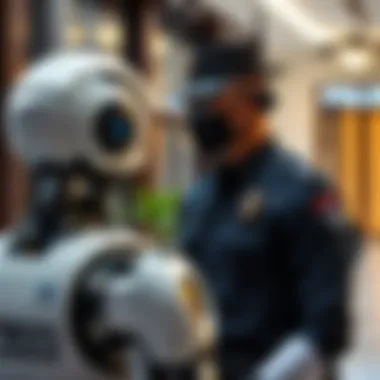Dubai Smart Police: Transforming Modern Law Enforcement


Intro
With the emergence of digital technologies, traditional law enforcement is experiencing a transformation, and Dubai is at the forefront of this evolution. The city has embarked on a groundbreaking journey with its Smart Police initiative, which combines the latest technological advancements with the essential elements of public safety. As a bustling metropolis with a diverse population, Dubai presents unique challenges and opportunities in law enforcement. The Smart Police project not only aims to address these issues but actively seeks to revolutionize how policing is perceived and implemented.
This initiative leverages artificial intelligence, data analytics, and smart devices to enhance the efficiency and effectiveness of police operations. The implications are far-reaching, affecting everything from on-the-ground response times to the community's perception of safety. Understanding this new paradigm is vital for investors, analysts, and urban planners alike, as it has the potential to serve as a model for cities around the world. By diving into the operational facets of the Smart Police, we can glean insights not only into its current impact but also explore future possibilities and opportunities in urban law enforcement.
Prolusion to Dubai Smart Police
The concept of law enforcement is undergoing a radical transformation in various corners of the globe, but nowhere is this shift more pronounced than in Dubai, with its Smart Police initiative. This initiative is a bold step towards modernizing public safety measures by implementing state-of-the-art technology and innovative strategies. As cities expand and face the challenges of growing populations and urban complexities, initiatives like Dubai Smart Police signal a proactive approach to not only combat crime but also enhance the overall quality of life for residents and visitors alike.
Background of Dubai’s Law Enforcement
Historically, Dubai has had a unique standing in the realm of law enforcement. The growth from a modest fishing village to a thriving metropolis brought with it a myriad of security challenges. As the city expanded, the traditional methods of policing became insufficient to address the complexities arising from rapid urban development. The formation of Dubai's first police force in 1956, now known as the Dubai Police, laid the groundwork for a law enforcement model that has continually evolved. They recognize that maintaining safety and order requires not just manpower but innovative thinking and application of technology. This understanding guided the shift towards incorporating automation and data-driven decision-making into their operational framework. With the introduction of smart technologies, the police force aims to create a safer environment while fostering trust within the community.
The Vision Behind Smart Police
The Dubai Smart Police initiative was born from a vision to redefine policing as it is known. Leaders in Dubai saw the potential of technology not just as a tool but as a means to enhance transparency and effectiveness within law enforcement. The central vision focuses on leveraging technology and data analytics to identify and prevent crime, rather than merely responding to incidents after they occur. This proactive stance enhances their ability to allocate resources effectively, ensuring that communities feel secure and connected.
"The goal of the Smart Police initiative isn't just to patrol the streets, but to engage with the community and anticipate their safety needs through cutting-edge tools and systems."
The initiative also aims to foster a sense of collaboration between the Dubai Police and the public, drawing on community intelligence to tackle issues collaboratively. This reimagined relationship shifts the perception of police from enforcers of law to partners in community development. Dialogue, interaction, and technology come together under this vision, setting a precedent that could be a model for urban policing around the world.
In summary, the introduction of the Smart Police initiative is not just a technological upgrade but a comprehensive philosophy that seeks to genuinely address safety concerns while fostering community relations. As the subsequent sections delve into the specifics of technological advancements and operational frameworks, it's crucial to understand that these advancements are rooted in a vision that sees law enforcement as an integrated part of society, rather than a separate entity. The momentum generated by this initiative places Dubai at the forefront of a global movement, distinctly poised to influence police practices in urban environments worldwide.
Technological Advancements in Policing
The integration of technology into law enforcement has become a game changer, particularly in urban environments like Dubai. The Smart Police initiative signifies a move towards enhanced security measures that are not only reactive but also proactive. Leveraging advanced tools, this modern approach aims to optimize police operations, ultimately creating a safer community.
Use of Artificial Intelligence
AI in Crime Prediction
AI in crime prediction is a spotlight area for law enforcement. By harnessing vast amounts of data, algorithms can sift through patterns and anomalies, helping to forecast potential criminal activities. One key characteristic of this technology is its ability to analyze past offenses, geographical data, and even socioeconomic indicators to determine where crimes are likely to occur next. This offers a strategic advantage, enabling resources to be allocated more efficiently.
Its unique feature lies in the capacity to identify not just where, but potentially when crimes might happen. For instance, if there have been spikes in certain types of offenses during specific times of the year or day, AI can alert police to increase their presence in those areas. However, there are concerns; reliance on data can lead to biases if not properly managed.
Facial Recognition Technology
Facial recognition technology represents another significant leap forward in policing. It employs advanced algorithms to identify individuals by analyzing facial structures. A notable characteristic of this technology is its rapid processing capabilities, allowing police to identify suspects swiftly, even in crowded environments. This immediate identification can help prevent crimes before they happen or catch suspects in the act.
The unique feature of facial recognition lies in its ability to operate in real-time. For instance, while monitoring a busy market, authorities can quickly locate individuals in wanted databases. While the swift nature of this technology is appealing, privacy issues and potential misuse have raised eyebrows among citizens and advocacy groups.


Mobile Apps and Community Engagement
Public Reporting Functions
Public reporting functions serve as a bridge between the community and law enforcement. Users can easily report incidents, share tips, or provide information about suspicious activities via dedicated mobile applications. The significant benefit here is heightened community involvement. By empowering citizens to communicate directly with police, a collaborative and informed environment is fostered.
These apps often feature user-friendly interfaces, making reporting as simple as a few taps on a screen. A unique aspect is the ability to upload multimedia content, such as photos or videos, which can aid investigations. However, it’s vital for the police to manage these reports effectively, as they can overwhelm the system if not organized properly.
Real-time Crime Alerts
Real-time crime alerts are pivotal in ensuring public safety, allowing citizens to stay informed about criminal activities as they unfold. Through push notifications, users receive instant alerts about incidents happening in their vicinity. This characteristic significantly enhances awareness and encourages proactive measures among residents.
The unique feature of this system is its rapid dissemination of information, which can be crucial for preventing further crimes. While this immediacy is beneficial, there's a risk of misinformation spreading if alerts are not carefully vetted before distribution. Ensuring accuracy while maintaining swift communication remains a challenge for law enforcement agencies.
"Technological advancements in policing reshape the landscape of law enforcement, focusing not just on punishment but on prevention and community collaboration."
In summary, the leap into technological advancements allows Dubai's Smart Police initiative to mold a more secure, connected, and responsive approach to public safety. With the spotlight on both artificial intelligence and mobile technology, it exemplifies how embracing change can lead to improved law enforcement outcomes.
Operational Framework of Smart Police
The operational framework of Dubai's Smart Police initiative is a pivotal element in reimagining law enforcement in the modern metropolis. The framework consists of two integral components: integration with existing systems and the establishment of a 24/7 surveillance and response mechanism. Together, these components ensure that the police force can operate efficiently, respond swiftly to emergencies, and leverage technology to enhance public safety while maintaining transparency and community trust.
Integration with Existing Systems
Collaboration with Local Agencies
Collaboration with local agencies is essential to the success of the Smart Police initiative. This partnership involves multiple stakeholders including governmental departments, community organizations, and private sector representatives. This cooperation allows for a holistic approach to crime prevention, where intelligence and resources can be pooled together for effective outcomes. A key characteristic of this collaboration is the shared commitment towards ensuring citizen safety and well-being. It is a smart choice within this article as it aligns with the overall vision of a connected policing network.
Unique features of this collaboration include the integration of diverse resources such as community feedback and local expertise, which enhances the officers’ knowledge about their assigned areas. By tapping into the strengths of various agencies, the Smart Police can maintain a proactive stance on crime and build trust in the community. Yet, it also comes with challenges—conflicting agendas, resource allocation disputes, and communication barriers can pose as disadvantages in maintaining seamless operational flow.
Data Sharing Protocols
Data sharing protocols are another cornerstone of the Smart Police framework. These protocols facilitate the flow of information among different agencies and divisions, laying the groundwork for a more interconnected approach to law enforcement. Emphasizing real-time data exchange, this initiative allows officers to access vital information instantly, making rapid and informed decisions vital when dealing with incidents.
One of the standout features of these protocols is the ability to analyze patterns from various data points, from crime statistics to traffic incidents, which can help in formulating strategies and deploying resources efficiently. The advantage lies in creating a transparent environment where data-driven decisions enhance operational efficiency. However, managing such large quantities of data raises concerns about privacy and security, requiring stringent protections to maintain community trust.
/ Surveillance and Response
Smart Cameras and Sensors
The deployment of smart cameras and sensors is a notable feature of the Smart Police operational framework. Through these advanced technologies, law enforcement in Dubai can monitor public spaces for any unusual activities or potential threats. These devices are strategically placed across the city, providing a real-time view that can significantly reduce response times during incidents.
The main characteristic of these devices is their capability to collect data while integrating seamlessly with the police’s operational systems. This makes it a beneficial tool within the context of this article, as it combines surveillance and intelligence gathering, which in turn bolsters security measures. However, reliance on such technologies comes with its own set of drawbacks. Issues of maintenance and the costs of implementing an expansive network can raise concerns about ongoing funding and resource allocation.


Central Command Operations
Central command operations serve as the heartbeat of the Smart Police initiative. This operational hub coordinates the data collected from various technologies and enables efficient response to incidents. Key characteristics of a central command center include integrated communication systems that allow for real-time updates and coordination among officers on the ground.
This structure is not only popular in this context but is also vital for ensuring optimal resource allocation during emergencies or major events, where rapid decision-making is crucial. One significant advantage is that it fosters an equipped and prepared police force, ready to tackle incidents as they arise. Yet, centralizing operations can sometimes lead to bureaucratic snags or delays in decision-making, especially if the command structure becomes too rigid.
Through the operational framework of the Dubai Smart Police, the future of effective policing unfolds. With the integration of technology and community-centric approaches, there’s potential for dynamic law enforcement that reflects the needs of a diverse and evolving population.
Public Perception and Community Impact
Public perception is a cornerstone when discussing any law enforcement initiative, particularly one as innovative as the Dubai Smart Police. The way the community views the police can significantly influence the effectiveness of policing methods and overall citizen compliance with the law. In a city like Dubai, known for its rapid growth and diverse population, understanding this relationship is essential. Community engagement not only reinforces public safety but also fosters a sense of trust and belonging among residents.
Community Trust and Safety
Trust between the Dubai Police and the community they serve plays a pivotal role in ensuring public safety. By integrating advanced technology, such as AI-driven tools and mobile apps, the Smart Police initiative significantly enhances the capacity for law enforcement to respond to incidents effectively and prevent crime. The visible presence of smart surveillance systems and the ability to report issues through user-friendly mobile platforms lend credibility to the police force.
This shift toward transparency and responsiveness not only makes citizens feel safer but also motivates them to participate actively in community safety efforts. As they become more involved in reporting suspicious activities or providing feedback on police actions, a partnership develops. Such a partnership transforms the conventional cop-on-the-beat model into a more collaborative effort, where police and citizens stand shoulder to shoulder in upholding community values and ensuring security.
The more trust the police gain, the more people will engage positively with law enforcement.
Feedback Mechanisms from Citizens
A system that values citizen input is central to the success of the Smart Police initiative. Clear and accessible feedback mechanisms allow residents to voice their concerns or commend police actions. Platforms for feedback can vary from mobile applications to community forums. These channels not only encourage active participation but also provide valuable insights into public sentiment towards policing strategies.
With regular citizen feedback, the Smart Police can adapt their strategies and tactics to better meet the needs of the community. This responsiveness goes a long way in reinforcing public confidence in law enforcement. It ensures that the policies in place are aligned with the expectations and needs of the community, creating an ongoing dialogue that bridges the gap between police activities and citizen concerns.
Emphasizing this two-way communication is vital; it empowers residents and transforms them into active participants in their safety. In turn, the Dubai Police are not just seen as an authority but as part of the fabric of the community.
In sum, public perception significantly affects the Smart Police initiative's success. By building community trust and implementing efficient feedback mechanisms, Dubai's police force can foster a safer environment, reinforcing the values of collaboration and accountability that lie at the heart of modern policing.
Challenges Faced by Smart Police
As the Dubai Police force adopts innovative technology through its Smart Police initiative, it is imperative to acknowledge the various hurdles that accompany such advancements. Addressing these challenges is vital not only for ensuring the effective implementation of smart policing strategies but also for maintaining public trust and safety, which are cornerstones of law enforcement. In a landscape defined by rapid technological change, understanding these challenges helps frame the broader discussion around security, efficiency, and public service in Dubai's urban ecosystem.
Privacy Concerns
The integration of technology in policing invariably raises questions about privacy. Citizens often grapple with the fear that enhanced surveillance measures, such as smart cameras and data analytics, might infringe on their personal freedoms. The fine line between safety and surveillance can sometimes feel like a tightrope walk where one misstep leads to public outcry.
In Dubai, where digital footprints are commonplace, the challenge intensifies amid an increasingly vigilant population. There's a pressing need for transparency regarding how data is collected, processed, and stored. An open conversation about privacy can assuage fears, ensuring that residents feel secure rather than monitored.
Some potential measures to tackle these concerns include:


- Clearer guidelines on data usage to provide the public with assurances that their personal information is safeguarded.
- Regular audits by independent bodies to guarantee compliance with privacy laws.
- Educational campaigns to inform citizens about the benefits of the technology while addressing their concerns directly.
Ultimately, building trust hinges on how effectively the Dubai Smart Police navigate this intricate landscape, ensuring the public’s safety without encroaching upon individual rights.
Technological Limitations
Despite the promise of cutting-edge technology, not all that glitters is gold. The Smart Police initiative faces its fair share of technological limitations that could hamper its objectives. For instance, systems can falter or present inaccurate data, undermining the efficacy of decisions made based on that information. As the saying goes, "garbage in, garbage out"—if the data is flawed, the outcomes can be detrimental.
Moreover, the adoption of new technologies often entails significant costs, both initial and ongoing. Upgrading infrastructure to support advanced tools requires funds, skilled personnel, and ongoing maintenance. While Dubai has the resources, allocation of budgets toward smart policing must be justified against other pressing needs in public service—essentially a balancing act.
Some challenges in tech deployment include:
- Interoperability issues between legacy systems and new technologies, which can slow down the operational efficacy.
- Staff training that ensures personnel are well-versed with these advanced tools.
- Scalability of technology, as the demands of a growing city may outstrip the capabilities of current systems.
In summary, while the road to advanced policing in Dubai is paved with potential, the Smart Police initiative must deftly navigate both privacy concerns and technological limitations to truly realize its vision.
Future of Policing in Dubai
The future of policing in Dubai is not just about new gadgets and flashy technology; it’s a holistic approach that aims to reshape the way law enforcement interacts with the community, ensures safety, and spearheads innovation in urban governance. As the world adapts to rapid changes brought about by technology, Dubai’s Smart Police initiative stands at the forefront of this evolution, setting a benchmark for other regions to follow.
Strategic Plans for Expansion
As Dubai continues to grow, with ambitious projects like the Dubai Creek Tower and the Dubai Sustainable City, the Smart Police initiative must also evolve. Expanding the scope and capabilities of the Smart Police is essential to meet the demands of an increasingly diverse and populous city. The Dubai Police have outlined several strategic plans aimed at enhancing operational effectiveness and public trust.
One cornerstone of this expansion is the integration of more sophisticated AI-driven systems that not only improve response times but also allow for proactive crime prevention. This includes:
- Enhancing Data Analytics: Using big data, the police can better understand crime patterns, enabling them to deploy resources where they are needed most.
- Increasing Community Outreach: Programs designed to educate residents about smart policing tools foster greater cooperation between citizens and law enforcement.
- Collaboration with Tech Firms: Partnering with innovative tech companies such as Tesla to test automated patrol vehicles could enhance police visibility and quick response capabilities in the air and on the ground.
By 2030, Dubai Police aims to have technology integrated in over 90% of their operations, actively shaping the future of public safety.
Potential Influence on Global Policing Standards
As Dubai leans into its Smart Police initiative, the impact is bound to ripple beyond its borders. The strategies deployed can serve as a template for other cities across the globe facing similar challenges in law enforcement. The key benefits of these innovations highlight a few transformative potentials:
- Setting Precedents in Law Enforcement: High-tech monitoring and quick responses can create a blueprint for global standards in urban policing.
- Promoting International Partnerships: Sharing data and findings with international law enforcement bodies could foster collaboration that enhances global security.
- Fostering Transparency: The initiatives promote an open dialogue between law enforcement and the community, which can be replicated in other countries to build trust.
As cities worldwide grapple with crime alongside the need for enhanced public safety, Dubai’s proactive approach may not just serve its citizens, but also inspire a global conversation on the future of policing methodology.
Finale
Summarizing the Impact of Smart Police
The impact of the Smart Police initiative in Dubai is profound and multifaceted. By harnessing advanced technology, this initiative not only improves efficiency in law enforcement but also enhances the overall safety landscape of the city. In a region noted for its rapid urbanization and population growth, the integration of smart solutions stands crucial. Citizens are more assured of their safety, knowing that they are under the watchful eyes of cutting-edge surveillance systems. Moreover, the proactive approach of Smart Police fosters a community-oriented policing model, where residents get involved through reporting functions via mobile applications.
A critical benefit of this initiative is the reduction of response times during emergencies. The real-time crime alerts help both the police force and the public stay informed, which can prevent potentially dangerous situations from escalating. Through the use of artificial intelligence and data analytics, law enforcement can adopt a predictive approach, targeting crime hotspots before they escalate into larger issues. This method builds additional trust within the community, as citizens see tangible results in their daily lives.
Call for Continuous Innovation
However, while the results of the Smart Police project in Dubai are very promising, the landscape of technology is ever-changing. Innovation must not be static; it needs to flow as rapidly as the urban environment itself. Law enforcement agencies must remain flexible and adaptable to new technologies to stay ahead of challenges. Continuous training for personnel is essential so that they remain proficient with the latest technologies and methods.
For instance, as data privacy concerns loom large, the authorities must find a balance. Citizens deserve to feel secure, but they also demand transparency. Engaging with the community through informational campaigns can help alleviate fears regarding surveillance and privacy. Furthermore, the Dubai Police should continuously evaluate and update their strategies based on results and community feedback, ensuring an ethos of continuous improvement.
Investors and stakeholders in this initiative have much to consider moving forward. The ongoing evolution in artificial intelligence, machine learning, and blockchain technology can yield even more benefits in the future. If Dubai successfully navigates these obstacles and remains committed to its strategic vision, it can shine as a beacon of modern policing globally, fostering an environment where safety and innovation walk hand in hand.











